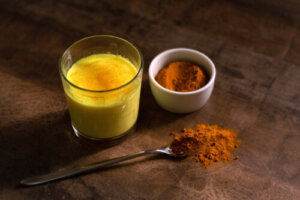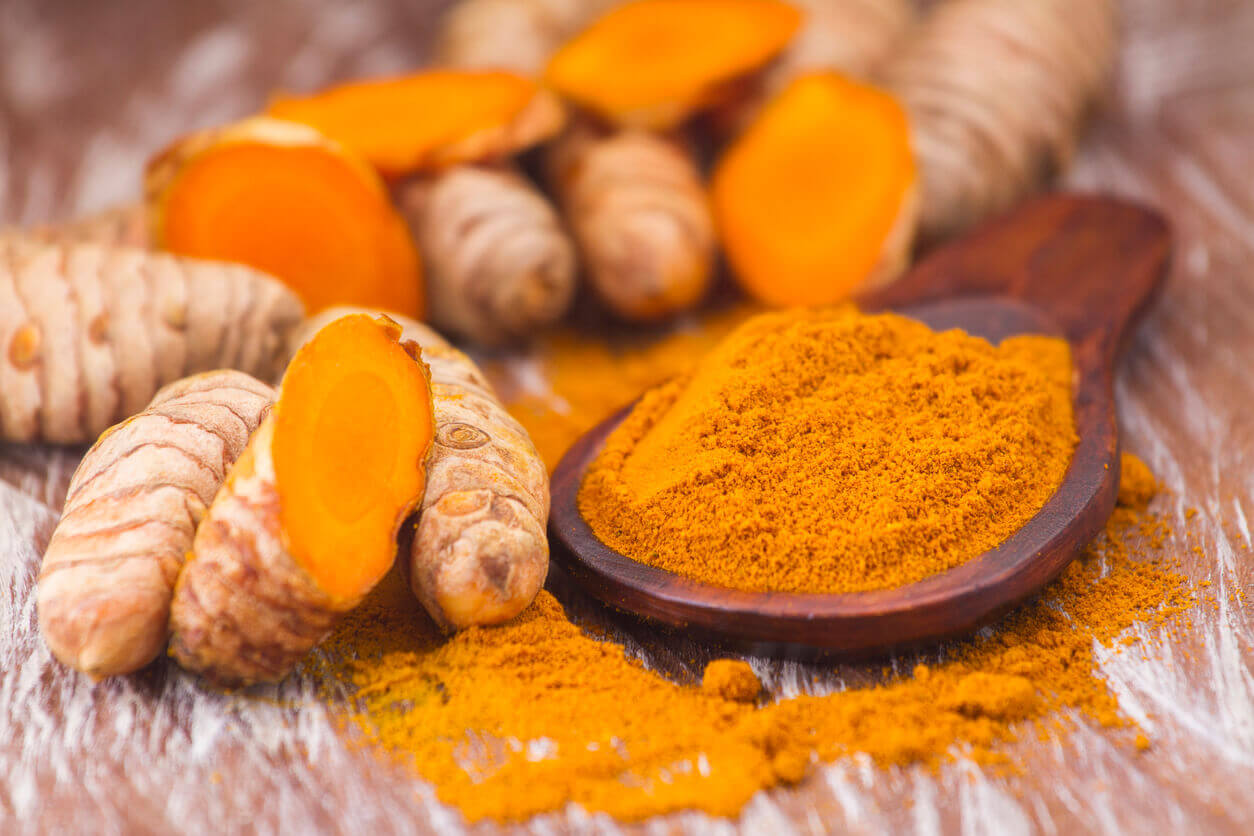Is It Safe to Take Turmeric During Pregnancy?


Written and verified by the nutritionist Saúl Sánchez Arias
Turmeric is one of the best culinary spices. It stands out for its anti-inflammatory and antioxidant properties, so it can be used to improve the state of health and prevent the development of complex diseases. Now, is it safe to take turmeric during pregnancy? We’ll answer this question right away in the article below.
Before we start, you have to take into account that during pregnancy, it’s essential to take care of your diet. There are certain foods, condiments, or herbs that are restricted during this period, as they could cause harmful effects on the fetus. It’s important to be aware of them to avoid making mistakes at this point.
The effects of turmeric during pregnancy
The first thing to note is that turmeric during pregnancy is safe to consume. Moreover, this spice has a number of benefits for pregnant women. Among them we can highlight the following:
- Facilitates digestion.
- Relieves colic.
- Generates an antioxidant effect that protects against the genesis of free radicals.
- Improves the rate of the renewal of skin cells.
- It contributes to alleviating the symptoms of arthritis or rheumatism.
In addition, it should be noted that turmeric contains a significant dose of vitamin C. For this reason, it’s capable of helping to reduce the incidence of many respiratory diseases, especially those of an infectious nature. According to a study published in Nutrients, this micronutrient is key to ensuring the proper functioning of the immune system.

Turmeric to prevent stomach pains during pregnancy
As the fetus develops, stomach discomfort becomes more regular. This is because the baby produces a slight pressure on some organs of the body, which can generate situations of reflux or heartburn. However, these can be combated through diet.
One of the best condiments to mitigate digestive problems is turmeric. This is due to its high anti-inflammatory power, which reduces internal pressure and decreases the incidence of reflux. Its inclusion in the diet of pregnant women could generate several benefits in this regard.
Most of these positive effects of turmeric are due to the presence of a phytonutrient within it, curcumin. This is evidenced by research published in Critical Reviews in Food Science and Nutrition. This element has even been associated with a decrease in the incidence of some types of cancer.
Turmeric and its effects on the baby’s development
It should be noted that ongoing inflammatory processes in the mother’s body can influence the proper development of the baby. In this context, the fetus is more likely to develop autism, hyperactivity, or other neurological disorders.
For this reason, turmeric could also be very beneficial in preventing health problems in the fetus. By helping to level systemic inflammation, this spice could contribute to ensuring correct gestation, favoring the good neurological function of the baby after birth.

Contraindications regarding turmeric during pregnancy
Turmeric is a very safe culinary spice. It should only be restricted during pregnancy in those women who have had previous allergic reactions to it. Most of them usually occur with skin rashes or headaches after the consumption of the spice.
It should be borne in mind, however, that an excessive amount of turmeric could generate some digestive discomfort due to irritation. It stimulates the production of gastric acids, which generates inconveniences in some people. Also, pregnant women with coagulation or liver problems should avoid its intake.
Turmeric: A beneficial spice during pregnancy
As you’ve seen, turmeric is a culinary spice capable of providing several benefits during pregnancy, both for the mother and for the fetus. In most cases, it can be included in the diet without any problem, and its regular presence in the diet is recommended.
However, it’s important to ensure that the dietary pattern is balanced and varied in order to experience all the positive effects we’ve discussed. It’ll also be necessary to maintain a certain degree of physical activity, as much as possible, to ensure that the fetus develops optimally.
Turmeric is one of the best culinary spices. It stands out for its anti-inflammatory and antioxidant properties, so it can be used to improve the state of health and prevent the development of complex diseases. Now, is it safe to take turmeric during pregnancy? We’ll answer this question right away in the article below.
Before we start, you have to take into account that during pregnancy, it’s essential to take care of your diet. There are certain foods, condiments, or herbs that are restricted during this period, as they could cause harmful effects on the fetus. It’s important to be aware of them to avoid making mistakes at this point.
The effects of turmeric during pregnancy
The first thing to note is that turmeric during pregnancy is safe to consume. Moreover, this spice has a number of benefits for pregnant women. Among them we can highlight the following:
- Facilitates digestion.
- Relieves colic.
- Generates an antioxidant effect that protects against the genesis of free radicals.
- Improves the rate of the renewal of skin cells.
- It contributes to alleviating the symptoms of arthritis or rheumatism.
In addition, it should be noted that turmeric contains a significant dose of vitamin C. For this reason, it’s capable of helping to reduce the incidence of many respiratory diseases, especially those of an infectious nature. According to a study published in Nutrients, this micronutrient is key to ensuring the proper functioning of the immune system.

Turmeric to prevent stomach pains during pregnancy
As the fetus develops, stomach discomfort becomes more regular. This is because the baby produces a slight pressure on some organs of the body, which can generate situations of reflux or heartburn. However, these can be combated through diet.
One of the best condiments to mitigate digestive problems is turmeric. This is due to its high anti-inflammatory power, which reduces internal pressure and decreases the incidence of reflux. Its inclusion in the diet of pregnant women could generate several benefits in this regard.
Most of these positive effects of turmeric are due to the presence of a phytonutrient within it, curcumin. This is evidenced by research published in Critical Reviews in Food Science and Nutrition. This element has even been associated with a decrease in the incidence of some types of cancer.
Turmeric and its effects on the baby’s development
It should be noted that ongoing inflammatory processes in the mother’s body can influence the proper development of the baby. In this context, the fetus is more likely to develop autism, hyperactivity, or other neurological disorders.
For this reason, turmeric could also be very beneficial in preventing health problems in the fetus. By helping to level systemic inflammation, this spice could contribute to ensuring correct gestation, favoring the good neurological function of the baby after birth.

Contraindications regarding turmeric during pregnancy
Turmeric is a very safe culinary spice. It should only be restricted during pregnancy in those women who have had previous allergic reactions to it. Most of them usually occur with skin rashes or headaches after the consumption of the spice.
It should be borne in mind, however, that an excessive amount of turmeric could generate some digestive discomfort due to irritation. It stimulates the production of gastric acids, which generates inconveniences in some people. Also, pregnant women with coagulation or liver problems should avoid its intake.
Turmeric: A beneficial spice during pregnancy
As you’ve seen, turmeric is a culinary spice capable of providing several benefits during pregnancy, both for the mother and for the fetus. In most cases, it can be included in the diet without any problem, and its regular presence in the diet is recommended.
However, it’s important to ensure that the dietary pattern is balanced and varied in order to experience all the positive effects we’ve discussed. It’ll also be necessary to maintain a certain degree of physical activity, as much as possible, to ensure that the fetus develops optimally.
All cited sources were thoroughly reviewed by our team to ensure their quality, reliability, currency, and validity. The bibliography of this article was considered reliable and of academic or scientific accuracy.
- Carr, A. C., & Maggini, S. (2017). Vitamin C and Immune Function. Nutrients, 9(11), 1211. https://doi.org/10.3390/nu9111211
- Kocaadam, B., & Şanlier, N. (2017). Curcumin, an active component of turmeric (Curcuma longa), and its effects on health. Critical reviews in food science and nutrition, 57(13), 2889–2895. https://doi.org/10.1080/10408398.2015.1077195
This text is provided for informational purposes only and does not replace consultation with a professional. If in doubt, consult your specialist.








